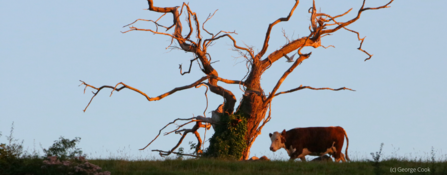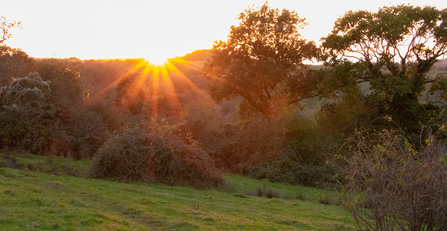One of these sites under threat is Yew Tree Farm, the last working farm within Bristol’s boundary. Catherine Withers, owner of the farm, is the third generation of her family who has been working the land here in south Bristol. Like her predecessors, Catherine uses wildlife-friendly farming practices which have maintained and improved the farm's habitats including ancient trees, woodland, scrub, hedgerows, grasslands and streams.
Bristol City Councils commitment to nature's recovery being tested!
(c) George Cook

(c) George Cook
In recognition of it’s value the site has been designated as a Site of Nature Conservation Interest (SNCI). However, despite the designation and its location in Green Belt, the farm is facing multiple threats from development that will degrade the site for nature and jeopardise the family's ability to maintain the economic viability of the farm. Bristol City Council is planning to expand Bristol South Crematorium into the species-rich meadows. While Redrow housing plans to build 200 houses on a 13-acre hay meadow at the southern end of the farm.
Avon Wildlife Trust objects to both of these developments. Ian Barrett, CEO of Avon Wildlife Trust stated that the farm is “an immensely rich wildlife habitat supporting a wide range of species including plants, bats and birds that are increasingly scarce in surrounding areas. It is vitally important that Sites of Nature Conservation Interest are protected through the planning system, and even more so in cases such as Yew tree Farm where the current wildlife value is so high.” Thanks to the variety of high quality habitats and Catherine's nature-friendly farming methods, the farm is home to a huge variety of wildlife. Barn owls, badgers, foxes, kestrels, buzzards, bullfinches, siskin, starlings, many species of butterflies and pollinators and even otters use the brook at the bottom of the farm!
In addition to its importance as an individual site, Yew Tree Farm SNCI is part of the wider landscape linking the city with the countryside. The nationwide approach to restoring nature set out in government strategies is based on the Lawton Report of 2010, ‘Making space for nature’. This report recognises that we need more, bigger, better and connected habitats to enable wildlife to survive, thrive and adapt to climate change. Bigger sites are needed to prevent ‘edge effects’ of being next to land where harmful pesticides, disturbance or other activities that could damage wildlife. Larger sites can also support larger populations and therefore reduce the risk of disease or bleak weather losing the species from the site altogether. Connected sites allow species to move across the landscape and also further reduce the changes of the species being lost.
The development planned to the Yew Tree Farm SNCI will result in the loss of high value wildlife habitats but will also lead to a decline in wildlife across the wider site due to shrinking and reducing the connectivity of habitats across the landscape.
For these reasons, Avon Wildlife Trust is opposed to all of the development proposals affecting the site including the Redrow development and the expansion of the crematorium. We are calling on Bristol City Council to follow their Ecological Emergency Action Plan and protect habitats across the city especially those that have been designated SNCI’s. We ask them to work with Catherine to ensure the fields are retained as they are so she can continue her current wildlife-friendly practices.
How can you help?
You can get in contact with the council and let them know your thoughts about the farm on following email address: democratic.services@bristol.gov.uk
You can also leave comments and objections to the planned expansion of the crematorium on the link here.
If you are concerned about other threats to nature on other SNCI's or nature sites we encourage you to engage with your MPs and decision makers and help #DefendNature

(c) George Cook










